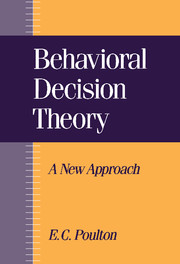Book contents
- Frontmatter
- Acknowledgments
- Contents
- Preface
- Chapter 1 Outline of heuristics and biases
- Chapter 2 Practical techniques
- Chapter 3 Apparent overconfidence
- Chapter 4 Hindsight bias
- Chapter 5 Small sample fallacy
- Chapter 6 Conjunction fallacy
- Chapter 7 Regression fallacy
- Chapter 8 Base rate neglect
- Chapter 9 Availability and simulation fallacies
- Chapter 10 Anchoring and adjustment biases
- Chapter 11 Expected utility fallacy
- Chapter 12 Bias by frames
- Chapter 13 Simple biases accompanying complex biases
- Chapter 14 Problem questions
- Chapter 15 Training
- Chapter 16 Overview
- References
- Index
Chapter 3 - Apparent overconfidence
Published online by Cambridge University Press: 06 July 2010
- Frontmatter
- Acknowledgments
- Contents
- Preface
- Chapter 1 Outline of heuristics and biases
- Chapter 2 Practical techniques
- Chapter 3 Apparent overconfidence
- Chapter 4 Hindsight bias
- Chapter 5 Small sample fallacy
- Chapter 6 Conjunction fallacy
- Chapter 7 Regression fallacy
- Chapter 8 Base rate neglect
- Chapter 9 Availability and simulation fallacies
- Chapter 10 Anchoring and adjustment biases
- Chapter 11 Expected utility fallacy
- Chapter 12 Bias by frames
- Chapter 13 Simple biases accompanying complex biases
- Chapter 14 Problem questions
- Chapter 15 Training
- Chapter 16 Overview
- References
- Index
Summary
Summary
Lack of confidence can produce apparent overconfidence. This can happen when people estimate the probability of correctness of their answers to 2-choice general knowledge questions, using a one-sided scale of probability extending only from .5 through 1.0. It can also happen in setting uncertainty bounds on unknown quantities using the fractile method. People show apparent overconfidence when rating the probability of correctness of their answers in other conditions: when performing an impossible task that is not judged to be impossible; when judging the probability of correctness of their answers from their familiarity with the area of knowledge instead of from their detailed knowledge of the questions asked; and when rating the probability of correctness of their answers using a logarithmic scale with very long odds.
Apparent overconfidence can be reduced by training with feedback, by employing trained experts who are warned against overconfidence, perhaps by reversing stimuli and responses in setting uncertainty bounds, and by making the response contraction bias oppose overconfidence. Overconfidence in predicting people's future progress encourages expert interviewers to rely on their clinical judgment and neglect the objective measures that they are given.
Lack of confidence can produce apparent overconfidence
Well-calibrated people have a pretty good idea of what they do and do not know, and of what they can and cannot do well. Calibration can be assessed by comparing people's average success at a task with their average estimates of success (Adams, 1957).
- Type
- Chapter
- Information
- Behavioral Decision TheoryA New Approach, pp. 33 - 61Publisher: Cambridge University PressPrint publication year: 1994



